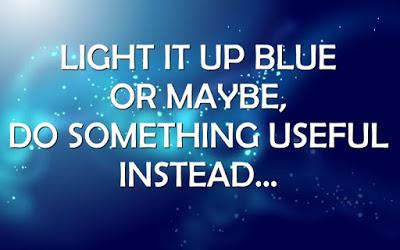
The month of April is “Light it up blue for autism” month. It's the month where we we embrace exciting concepts like autism “awareness” (ah, so that's the word we use to describe “these people”) and autism “acceptance”, (ok, so I guess we can't stone them to death anymore**).
** That's a joke by the way.
They might have been started with the best of intentions but I'm really not sure that they help as much as they'd like us to think. In fact, it's just possible that they do more harm than good.
It's not Just Autism
There are a lot of charities around which gear up on certain months. In particular, there are the yellow cancer charities and the pink breast cancer ones.The various charities collect funds from the sale of ribbons, bears, chocolates and other goodies. The more established of these charities also partner with grocery stores and manufacturers to produce specific items, such as bread in marked packaging, where a certain percentage of the cost is going to the charity.
What is it all for?
One of the biggest gripes that I have with the cancer groups is that they are always giving out free hats or sunglasses. In fact I've been to a couple of charity runs where I saw them giving free branded hats to people who were already wearing hats. How does that help people with cancer or their families? How is that a good use of money? The other thing that particularly annoys me about the cancer expenditure is that whenever we see advertising, it gives the impression that cancer comes from the beach, while ignoring the message that needs to be sent to all the shirtless guys on building sites.
The other thing that particularly annoys me about the cancer expenditure is that whenever we see advertising, it gives the impression that cancer comes from the beach, while ignoring the message that needs to be sent to all the shirtless guys on building sites.What would I do?
Of course, it's easy to complain about things but it's much harder to suggest alternatives.So here's my wish list for “light it up blue”
Education is Key
Instead of spending money trying to to get people to follow a colour, let's try to get some concepts across;How about some slogans like;
- AUTISM: If they're covering their ears in your shop, please turn your ambient music off.
- AUTISM: Those repetitive movements are called “stimming” and they can help us to relax.
- People with #Autism make excellent workers.
- AUTISM: Eye contact can be painful. Don't make us do it. We're still listening.
Got a message? Maybe a bumper sticker would be a good way to get it across -- and you can still light it up blue if you really need to.

Low cost means, let's not make billboards or hats or T-Shirts. Lets use the free tools like Twitter and Facebook and lets use our connections to get mentions and interviews on the radio. What's wrong with getting a large group of kids with autism together to make a big sign in the sand on the beach.
Don't Spend Money on Bureaucracy
Whenever you are donating to charities, it's important to keep in mind that they all have significant operating costs. The have secretaries and management staff to pay, building management funds, billboards and other forms of advertising to support. By the time your contributions reach the intended target audience, they're very diluted indeed.Then of course, once they do reach the audience, who's to say that the choices of support that they make, the slogans that they choose are the ones that you would personally choose to support.
Make a Direct Difference if you can
If you own a place, like a theme park, a cafe, a sports club or a movie theater then you can make a difference by simply offering free or discounted rates for a day or a week or even for the whole month, to families with people who have autism.One thing that impressed me this years was that the Apple App Store ran some events and reduced the price of a number of apps which are used by people with autism.
In many ways, this is better than giving to a charity. It will bring attention to your business while helping families who are otherwise unable to go out.
Make a Personal Difference if you can
If you know a family with autism, then you can make a personal difference. Why not offer to take their children for an outing or to "babysit" while the parents go out. Find a way to be involved in the family. If you have teaching skills, you might want to offer to tutor their child.If you know adults with autism, you might make special effort to interact with them, particularly if they're socially isolated. For most people with autism, simply spending some time with them on their special interests will make their day.
Every little bit helps and in general, offering your time to an afflicted family is far better than offering money to support the agenda of a faceless organisation.

